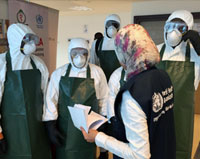 Proper use of personal protective equipment is an important feature of training23 March 2015, Khartoum – Sudan’s Federal Minister of Health Mr. Bahar Idris Abu Garda inaugurated the first subregional training workshop for the national rapid response teams on Ebola virus disease (EVD) to help strengthening preparedness and response capacity in the Eastern Mediterranean Region.
Proper use of personal protective equipment is an important feature of training23 March 2015, Khartoum – Sudan’s Federal Minister of Health Mr. Bahar Idris Abu Garda inaugurated the first subregional training workshop for the national rapid response teams on Ebola virus disease (EVD) to help strengthening preparedness and response capacity in the Eastern Mediterranean Region.
The Federal Minister of Health, who heads the Higher Committee for Ebola Preparedness and Response in Sudan, expressed his commitment to strengthening health sector preparedness for EVD and other health threats through regular training of the national rapid response teams including organizing periodic drills and simulation exercises to test the readiness of national health systems to manage such emerging threats.
“We are pleased to organize this first emergency training workshop for national rapid response teams on Ebola virus disease,” says the acting WHO Representative in Sudan Dr Naeema Al Gasseer. “This workshop will build and develop national capacity to deal not only with EVD but any other emerging infectious diseases and I would like to assure you of WHO’s continued support to expand and cascade this very timely training initiative”.
The training was conducted on 15-19 March 2015 in Khartoum, with 39 participants who were carefully selected from among different national stakeholders including epidemiologists, laboratory technicians, nurses, public health and emergency staff from Sudan and Yemen. They were trained by facilitators and observers from the Egyptian Society of Epidemiology, WHO and the Federal Ministry of Health of Sudan. The five-day training course included interactive plenary sessions, group works and simulation exercises covering essential functions of multidisciplinary rapid response teams including disease surveillance, risk assessment, infection prevention and control, contact tracing, risk communication and safe burial.
Over the past year, the EVD outbreak has been the largest and most complex Ebola outbreak on record. This epidemic represents a threat to global health security and highlights the urgency for addressing the immediate needs to enhance preparedness and response capacity in non-affected countries. The emergency training for national rapid response teams is part of WHO’s regional action plan to support improvement in preparedness and readiness measures for EVD in the Region.



